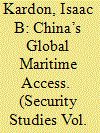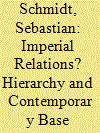|
|
|
Sort Order |
|
|
|
Items / Page
|
|
|
|
|
|
|
| Srl | Item |
| 1 |
ID:
188895


|
|
|
|
|
| Summary/Abstract |
China lacks the network of foreign military bases that typically attends great-power expansion, yet its armed forces operate at an increasingly global scale. How has the People’s Liberation Army (PLA) managed this feat without a significant footprint on foreign soil? Why has Chinese leadership not (yet) established a network of bases to address security threats to China’s overseas interests? This article analyzes the structural constraints facing China’s military basing abroad and then examines the methods by which the PLA has nonetheless achieved significant global power-projection capability. It highlights the capacity provided by international maritime transport infrastructure owned and operated by Chinese firms as a viable—yet limited—means of securing national interests overseas with military power. The study demonstrates that the structural setting and historical sequence of China’s rise render foreign military bases relatively costly, incentivizing alternative modes of access and power projection in the maritime domain.
|
|
|
|
|
|
|
|
|
|
|
|
|
|
|
|
| 2 |
ID:
188896


|
|
|
|
|
| Summary/Abstract |
The prevailing assumption in discussions of foreign military basing is that such presences are hierarchical in nature. Though this was unavoidably the case prior to the Second World War, changes in the normative framework of international politics mean that such presences’ relationship to hierarchy has become an empirical question. Specifically, changes in sovereignty norms and the emergence of territorial and jurisdictional integrity render the linkage between foreign military basing and hierarchy contingent. As a result, some basing arrangements’ dynamics now closely resemble those of other interstate agreements. This analysis regrounds hierarchy in the specific normative context of action and in doing so highlights the implicit reification of the state in contemporary security studies. In practical terms, it shows how assuming hierarchy both overestimates the fragility of the US basing network and, by exaggerating authority relations, obscures the potential for greater fluidity in the basing space.
|
|
|
|
|
|
|
|
|
|
|
|
|
|
|
|
| 3 |
ID:
188894


|
|
|
|
|
| Summary/Abstract |
Although commonly assumed to secure trade, the influence of both naval power and merchant fleets on combatants’ ability to secure trade has been rarely explored. Using the gravity model on a dataset spanning 1980–2011, this study shows that the damage conflict inflicts on states’ third-party trade declines as both their naval power and commercial fleet size increase. Beyond validating core assumptions of modern maritime strategy, our results make a valuable contribution to the extensive literature on trade and conflict. The notion that trade integration fosters peace rests on the assumption that conflict depresses third-party trade, thereby reducing trade-integrated states’ propensity to initiate conflict. As this study shows, however, naval power and merchant fleets mitigate these trade-related costs of conflict. Thus, the ability of trade to deter conflict declines when states possess substantial maritime capabilities.
|
|
|
|
|
|
|
|
|
|
|
|
|
|
|
|
| 4 |
ID:
188893


|
|
|
|
|
| Summary/Abstract |
Turkey’s 2019 acquisition of Russian S-400 missile batteries is puzzling. Despite repeated threats of sanctions by the United States, North Atlantic Treaty Organization ally Turkey purchased a multi-billion-dollar Russian air defense system that remains nonoperational, fails to cover Turkey’s air defense gap, and led to Turkey’s costly expulsion from the F-35 program. We argue unexpected domestic constraints created by the ruling Justice and Development Party (AKP)’s symbolic diplomacy raised the political costs of backing away from the deal. Collecting data from media reports and interviews, we analyze how Turkey’s AKP wielded the S-400 as a weapons system legitimating an identity narrative of Turkey as regional counterhegemon, facilitating the cultivation of coalitions with multiple, often competing, constituencies. We demonstrate via process tracing how the inherent ambiguity of symbols allowed nationalist constituencies key to the AKP’s hold on power to amplify the S-400 as symbolic of Turkey’s sovereignty, trapping Turkish officials in a costly policy corner. In unpacking Turkey’s S-400 purchase, the article contributes to the literature on symbolic diplomacy, audience costs, weapons procurement, and deterrence failure.
|
|
|
|
|
|
|
|
|
|
|
|
|
|
|
|
| 5 |
ID:
188892


|
|
|
|
|
| Summary/Abstract |
Do emerging and disruptive technologies yield an offensive advantage? This is a question of central theoretical and substantive relevance. For the most part, however, the literature on this topic has not investigated empirically whether such technologies make attacking easier than defending, but it has largely assumed that they do. At the same time, work on the offense–defense balance has primarily focused on land conflicts, thus offering little understanding of the effect of technological change in other domains, such as the air and sea. In this article we address these gaps by investigating whether current- and next-generation drones shift the offense–defense balance toward the offense or toward offense dominance, as many assume—that is, whether drone technology can or will defeat current- and next-generation air defense systems. To answer these questions, we have explored the literature in radar engineering, electromagnetism, signal processing, and air defense operation. Our analysis challenges the existing consensus about the present and raises questions about the future. Our findings also demonstrate how important it is for the field of security studies to embrace greater interdisciplinarity in order to explore pressing policy and theoretical questions.
|
|
|
|
|
|
|
|
|
|
|
|
|
|
|
|
|
|
|
|
|